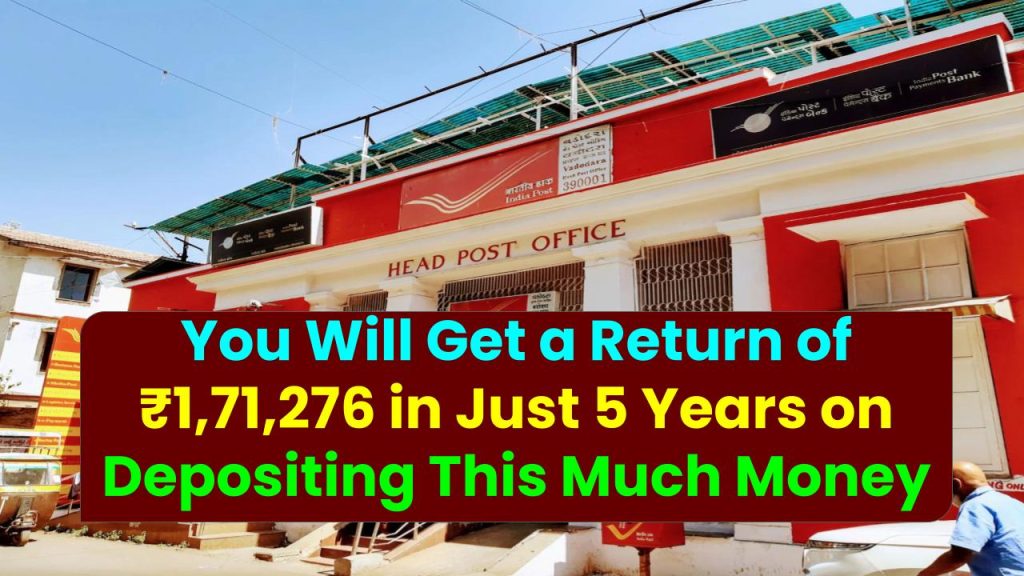
If you’re searching for a safe investment option with decent returns, the Post Office Recurring Deposit (RD) Scheme might be exactly what you need. According to recent data, by depositing just ₹2,500 every month, you can accumulate ₹1,71,276 in just 5 years—all without the risks associated with stock markets or mutual funds.
This article will break down how this popular India Post savings scheme works, how much you need to invest, what interest rates are offered, and why it’s a smart choice for both conservative investors and working professionals looking for guaranteed returns.
Post Office RD Scheme
| Feature | Details |
|---|---|
| Scheme Name | Post Office Recurring Deposit (RD) |
| Monthly Deposit | ₹2,500 |
| Tenure | 5 Years (60 months) |
| Interest Rate (as of Q1 FY 2024-25) | 6.7% per annum, compounded quarterly |
| Total Investment | ₹1,50,000 |
| Maturity Amount | ₹1,71,276 |
| Total Interest Earned | ₹21,276 |
| Risk Level | Zero risk (Government-backed) |
| Eligibility | Any Indian resident aged 18+ |
| Official Website | India Post RD |
The Post Office RD scheme is a shining example of how consistent savings, even in small amounts, can lead to meaningful returns. With just ₹2,500 per month, you can build a corpus of ₹1,71,276 in 5 years, all while enjoying zero risk and quarterly compounding benefits.
Whether you’re saving for a child’s future, a family event, or just want a disciplined way to grow your wealth, this India Post product is reliable, easy to manage, and backed by government trust.
What is the Post Office Recurring Deposit Scheme?
The Post Office RD scheme is a government-backed small savings scheme that allows you to deposit a fixed amount every month for a period of five years. In return, you earn compound interest quarterly—making your money grow steadily and safely over time.
This scheme is especially suitable for:
- Salaried individuals
- Homemakers looking to build a fund
- Parents planning future expenses
- Senior citizens seeking risk-free investments
Backed by the Government of India, it offers guaranteed returns, unlike market-linked products like SIPs or ULIPs.
see also: How Much Fund Will You Get If You Deposit ₹10,000 Monthly in Recurring Deposit?
How ₹2,500 a Month Becomes ₹1,71,276 in 5 Years
Let’s break down the math.
- Monthly deposit: ₹2,500
- Tenure: 5 years (60 months)
- Interest rate: 6.7% per annum (compounded quarterly)
Using the RD formula:
M = R × [(1 + i)^n – 1] / (1 – (1 + i)^(-1/3))
Where:
- M = Maturity amount
- R = Monthly deposit
- i = Quarterly interest rate ÷ 3 = 6.7/400 = 0.01675
- n = 20 quarters in 5 years
When calculated, the maturity amount comes to ₹1,71,276. Your investment of ₹1.5 lakh earns you an interest of ₹21,276—a solid return for a no-risk scheme.
Post Office RD Interest Rate
The current interest rate for the RD scheme, effective from April 1 to June 30, 2024, is:
6.7% per annum, compounded quarterly
This rate is revised every quarter by the Ministry of Finance and tends to stay higher than bank RDs, especially for those seeking secure, long-term investments.
Features & Benefits of Post Office RD Scheme
Safe & Government-Backed
Your money is 100% secure, unlike volatile mutual funds or stocks. The scheme is managed by India Post under the oversight of the Ministry of Finance.
Affordable Investment
You can start with as low as ₹100 per month, making it accessible to low-income households, students, and first-time investors.
Compound Interest Advantage
Since the interest is compounded quarterly, your earnings grow faster than a simple interest plan.
Premature Withdrawal Option
Though the scheme has a lock-in period, premature withdrawal is allowed after 3 years (36 installments), subject to conditions.
Loan Against RD
You can avail loan up to 50% of your deposit after 12 installments, which is useful for emergencies.
Step-by-Step Guide: How to Open a Post Office RD Account
Step 1: Visit Your Nearest Post Office
Head to the branch where you already have a savings account. If not, you’ll need to open one.
Step 2: Fill the RD Account Form
You can collect the form at the branch or download it from India Post Forms.
Step 3: Submit KYC Documents
Keep the following documents handy:
- Aadhaar Card
- PAN Card
- Passport-sized photo
- Address proof (if different from Aadhaar)
Step 4: Make the First Deposit
Minimum deposit: ₹100
Multiple of ₹10 (e.g., ₹500, ₹2,000, etc.)
You can also set up auto-debit from your Post Office savings account.
Step 5: Get Passbook & RD Details
You’ll receive a physical passbook showing your deposits, interest accrued, and maturity value.
Who Should Invest in This Scheme?
This scheme is perfect for:
- Parents saving for a child’s education
- Professionals building a disciplined saving habit
- Retirees seeking a fixed income source
- First-time investors who want guaranteed returns
If you’re aiming to create a fund for future goals without any risk, Post Office RD is one of the best options in India.
Tax Implications on RD Returns
Here’s the important part: Interest earned on Post Office RD is taxable under “Income from Other Sources.”
- TDS is not deducted by the Post Office.
- You must declare the interest in your ITR.
- If total income is below taxable limits, no tax liability applies.
There is no tax deduction benefit under Section 80C for Post Office RD (unlike NSC or PPF).
see also: You Will Get a Profit of Rs 1,40,000 if You Invest for 4 Years and 7 Months
FAQs on Post Office RD Scheme
1. Can I open a joint Post Office RD account?
Yes, joint accounts can be opened by up to 3 adults. The maturity amount is paid to the surviving holder(s) in case of death.
2. Is premature withdrawal allowed?
Yes, after completing 36 installments (3 years), you can withdraw early. However, you will receive less interest if closed prematurely.
3. What happens if I miss a deposit?
You can still continue the RD, but a penalty of ₹1 per ₹100 per month is charged. If you miss 4 consecutive installments, the account becomes “discontinued.”
4. Can NRIs open a Post Office RD?
No, only resident Indians can invest in Post Office RD schemes.
5. How do I calculate the maturity amount?
Use the official India Post RD calculator or plug values into the compound interest formula explained earlier.











